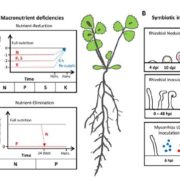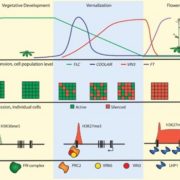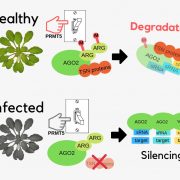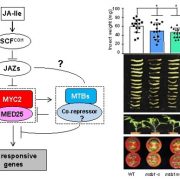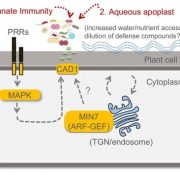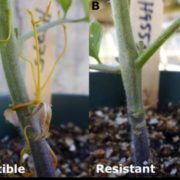A plant phytosulfokine peptide initiates auxin-dependent immunity through cytosolic Ca2+ signaling (Plant Cell)
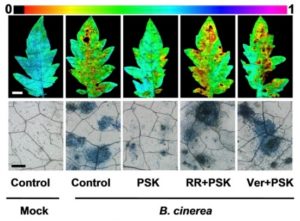 Plants are exposed to a wide variety of biotic stressors such as herbivores and microbial pathogens. Thus, they have developed a sophisticated response system which involves different signal molecules and accurate signaling pathway responses. Among them, phytosulfokine (PSK), a disulfated pentapeptide, has been suggested to be a key signaling molecule, but evidence that supports this fact has been scarce. In this report, Zhang et al. show that PSK is a damage-associated signaling molecule with potential to be used to enhance disease resistance in different plant species. They show that PSK biosynthesis, modification and perception are very important for plant immunity related to tomato responses against the fungal pathogen Botrytis cinerea, and that PSK activation of the PSK receptor 1, RPSK1, enhances calcium cytosolic concentration. This increase in calcium content is sensed by the calcium binding protein calmodulin which then interacts with YUCs (auxin biosynthesis enzymes) initiating auxin-dependent immune responses. (Summary by Maria Julissa Ek-Ramos) The Plant Cell. 10.1105/tpc.17.00537
Plants are exposed to a wide variety of biotic stressors such as herbivores and microbial pathogens. Thus, they have developed a sophisticated response system which involves different signal molecules and accurate signaling pathway responses. Among them, phytosulfokine (PSK), a disulfated pentapeptide, has been suggested to be a key signaling molecule, but evidence that supports this fact has been scarce. In this report, Zhang et al. show that PSK is a damage-associated signaling molecule with potential to be used to enhance disease resistance in different plant species. They show that PSK biosynthesis, modification and perception are very important for plant immunity related to tomato responses against the fungal pathogen Botrytis cinerea, and that PSK activation of the PSK receptor 1, RPSK1, enhances calcium cytosolic concentration. This increase in calcium content is sensed by the calcium binding protein calmodulin which then interacts with YUCs (auxin biosynthesis enzymes) initiating auxin-dependent immune responses. (Summary by Maria Julissa Ek-Ramos) The Plant Cell. 10.1105/tpc.17.00537




